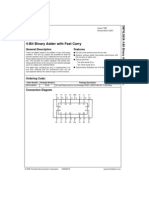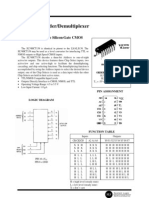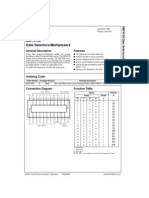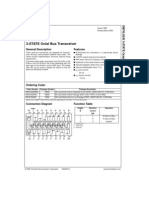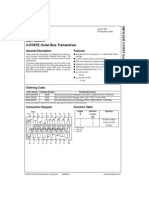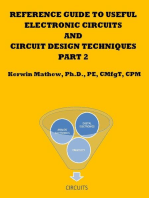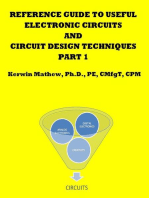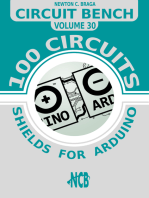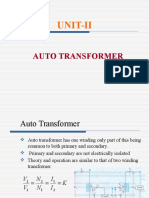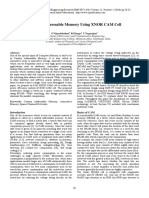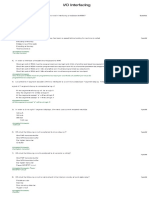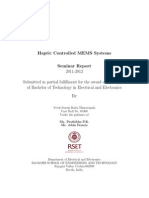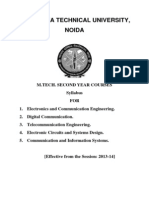DM74LS257B 3-STATE Quad 2-Data Selectors/Multiplexers: General Description Features
DM74LS257B 3-STATE Quad 2-Data Selectors/Multiplexers: General Description Features
Uploaded by
franciscoCopyright:
Available Formats
DM74LS257B 3-STATE Quad 2-Data Selectors/Multiplexers: General Description Features
DM74LS257B 3-STATE Quad 2-Data Selectors/Multiplexers: General Description Features
Uploaded by
franciscoOriginal Description:
Original Title
Copyright
Available Formats
Share this document
Did you find this document useful?
Is this content inappropriate?
Copyright:
Available Formats
DM74LS257B 3-STATE Quad 2-Data Selectors/Multiplexers: General Description Features
DM74LS257B 3-STATE Quad 2-Data Selectors/Multiplexers: General Description Features
Uploaded by
franciscoCopyright:
Available Formats
Revised November 1999
DM74LS257B
3-STATE Quad 2-Data Selectors/Multiplexers
General Description
These Schottky-clamped high-performance multiplexers
feature 3-STATE outputs that can interface directly with
data lines of bus-organized systems. With all but one of the
common outputs disabled (at a high impedance state), the
low impedance of the single enabled output will drive the
bus line to a HIGH or LOW logic level. To minimize the possibility that two outputs will attempt to take a common bus
to opposite logic levels, the output enable circuitry is
designed such that the output disable times are shorter
than the output enable times.
This 3-STATE output feature means that n-bit (paralleled)
data selectors with up to 258 sources can be implemented
for data buses. It also permits the use of standard TTL registers for data retention throughout the system.
Features
3-STATE versions LS157 and LS158 with same pinouts
Schottky-clamped for significant improvement in A-C
performance
Provides bus interface from multiple sources in
high-performance systems
Average propagation delay from data input 12 ns
Typical power dissipation: 50 mW
Ordering Code:
Order Number
Package Number
Package Description
DM74LS257BM
M16A
16-Lead Small Outline Integrated Circuit (SOIC), JEDEC MS-012, 0.150 Narrow
DM74LS257BN
N16E
16-Lead Plastic Dual-In-Line Package (PDIP), JEDEC MS-001, 0.300 Wide
Devices also available in Tape and Reel. Specify by appending the suffix letter X to the ordering code.
Connection Diagram
Logic Diagram
Function Table
Inputs
Output
Output Y
Select
LS257
Control
H = HIGH Level
L = LOW Level
X = Dont Care
Z = High Impedance (off)
1999 Fairchild Semiconductor Corporation
DS006417
www.fairchildsemi.com
DM74LS257B 3-STATE Quad 2-Data Selectors/Multiplexers
June 1989
DM74LS257B
Absolute Maximum Ratings(Note 1)
Supply Voltage
7V
Input Voltage
7V
0C to +70C
Operating Free Air Temperature Range
Storage Temperature Range
Note 1: The Absolute Maximum Ratings are those values beyond which
the safety of the device cannot be guaranteed. the device should not be
operated at these limits. The parametric values defined in the Electrical
Characteristics tables are not guaranteed at the absolute maximum ratings.
The Recommended Operating Conditions table will define the conditions
for actual device operation.
65C to +150C
Recommended Operating Conditions
Symbol
Parameter
Min
Nom
Max
Units
VCC
Supply Voltage
4.75
5.25
VIH
HIGH Level Input Voltage
VIL
LOW Level Input Voltage
0.8
IOH
HIGH Level Output Current
2.6
mA
IOL
LOW Level Output Current
24
mA
TA
Free Air Operating Temperature
70
DC Electrical Characteristics
Symbol
Parameter
Conditions
VI
Input Clamp Voltage
VCC = Min, II = 18 mA
VOH
HIGH Level Output Voltage
VIL = Max, VIH = Min
VOL
II
IIH
IIL
IOZH
IOZL
Min
Typ
(Note 2)
Max
1.5
2.4
3.1
LOW Level Output
VIL = Max, VIH = Min
0.35
0.5
IOL = 12 mA, VCC = Min
0.25
0.4
Input Current @ Max
VCC = Max,
Select
0.2
Input Voltage
VI = 7V
Other
0.1
HIGH Level Input
VCC = Max,
Select
40
Current
VI = 2.7V
Other
20
LOW Level Input
VCC = Max,
Select
0.8
Current
VI = 0.4V
Other
0.4
OFF-State Output Current with
VCC = Max, VO = 2.7V
HIGH Level Output Voltage Applied
VIH = Min, VIL = Max
OFF-State Output Current with
VCC = Max, VO = 0.4V
LOW Level Output Voltage Applied
VIH = Min, VIL = Max
Short Circuit Output Current
VCC = Max (Note 3)
ICCH
Supply Current with Outputs HIGH
VCC = Max (Note 4)
ICCL
Supply Current with Outputs LOW
VCC = Max (Note 4)
ICCZ
Supply Current with Outputs Disabled VCC = Max (Note 4)
20
mA
A
mA
A
20
A
mA
5.9
10
mA
9.2
16
mA
12
19
mA
Note 3: Not more than one output should be shorted at a time, and the duration should not exceed one second.
Note 4: ICC is measured with all outputs open and all possible inputs grounded, while achieving the stated output conditions.
100
20
Note 2: All typicals are at VCC = 5V, TA = 25C.
www.fairchildsemi.com
V
V
Voltage
IOS
Units
VCC = 5V and TA = 25C
RL = 667
Symbol
Parameter
CL = 45 pF
From (Input)
To (Output)
tPLH
Propagation Delay Time
LOW-to-HIGH Level Output
tPHL
Propagation Delay Time
HIGH-to-LOW Level Output
tPLH
Propagation Delay Time
LOW-to-HIGH Level Output
tPHL
Propagation Delay Time
HIGH-to-LOW Level Output
tPZH
Output Enable Time
to HIGH Level Output
tPZL
Output Enable Time
to LOW Level Output
tPHZ
Output Disable Time from
HIGH Level Output (Note 5)
tPLZ
Output Disable Time from
LOW Level Output (Note 5)
Min
CL = 150 pF
Max
Min
Units
Max
Data to Output
18
27
ns
Data to Output
18
27
ns
Select to Output
28
35
ns
Select to Output
35
42
ns
Output Control to Y
15
27
ns
Output Control to Y
28
38
ns
Output Control to Y
28
ns
Output Control to Y
25
ns
Note 5: CL = 5 pF
www.fairchildsemi.com
DM74LS257B
Switching Characteristics
DM74LS257B
Physical Dimensions inches (millimeters) unless otherwise noted
16-Lead Small Outline Integrated Circuit (SOIC), JEDEC MS-012, 0.150 Narrow
Package Number M16A
www.fairchildsemi.com
DM74LS257B 3-STATE Quad 2-Data Selectors/Multiplexers
Physical Dimensions inches (millimeters) unless otherwise noted (Continued)
16-Lead Plastic Dual-In-Line Package (PDIP), JEDEC MS-001, 0.300 Wide
Package Number N16E
Fairchild does not assume any responsibility for use of any circuitry described, no circuit patent licenses are implied and
Fairchild reserves the right at any time without notice to change said circuitry and specifications.
LIFE SUPPORT POLICY
FAIRCHILDS PRODUCTS ARE NOT AUTHORIZED FOR USE AS CRITICAL COMPONENTS IN LIFE SUPPORT
DEVICES OR SYSTEMS WITHOUT THE EXPRESS WRITTEN APPROVAL OF THE PRESIDENT OF FAIRCHILD
SEMICONDUCTOR CORPORATION. As used herein:
2. A critical component in any component of a life support
device or system whose failure to perform can be reasonably expected to cause the failure of the life support
device or system, or to affect its safety or effectiveness.
1. Life support devices or systems are devices or systems
which, (a) are intended for surgical implant into the
body, or (b) support or sustain life, and (c) whose failure
to perform when properly used in accordance with
instructions for use provided in the labeling, can be reasonably expected to result in a significant injury to the
user.
www.fairchildsemi.com
www.fairchildsemi.com
This datasheet has been downloaded from:
www.DatasheetCatalog.com
Datasheets for electronic components.
You might also like
- Substation Automation Systems: Design and ImplementationFrom EverandSubstation Automation Systems: Design and ImplementationRating: 4.5 out of 5 stars4.5/5 (3)
- DC Ac Pure Sine Wave Inverter With MinimDocument66 pagesDC Ac Pure Sine Wave Inverter With MinimKang Aryo100% (1)
- 74LS393-Dual 4-Bit Binary CounterDocument6 pages74LS393-Dual 4-Bit Binary Counterkakashi116No ratings yet
- 74LS374Document8 pages74LS374Bechtel LanutanNo ratings yet
- 74LS164Document5 pages74LS164Byron MendozaNo ratings yet
- sn74138 PDFDocument7 pagessn74138 PDFdujobozinovicNo ratings yet
- DM74LS574 Octal D-Type Flip-Flop With 3-STATE Outputs: General DescriptionDocument6 pagesDM74LS574 Octal D-Type Flip-Flop With 3-STATE Outputs: General DescriptionNicolas Yesenia VictorNo ratings yet
- 74LS574Document6 pages74LS574aminotepNo ratings yet
- DM74LS244 Octal 3-STATE Buffer/Line Driver/Line Receiver: General Description FeaturesDocument6 pagesDM74LS244 Octal 3-STATE Buffer/Line Driver/Line Receiver: General Description FeaturesJonnathan AriasNo ratings yet
- 74LS150 PDFDocument4 pages74LS150 PDFMaria Alejandra Vegas ArraezNo ratings yet
- 74LS73Document5 pages74LS73Cristin BarnesNo ratings yet
- 74ls151 MuxDocument8 pages74ls151 MuxEnnio Antonio100% (1)
- DM74LS164 8-Bit Serial In/Parallel Out Shift Register: General Description FeaturesDocument5 pagesDM74LS164 8-Bit Serial In/Parallel Out Shift Register: General Description FeaturesRoby Adi WibowoNo ratings yet
- 74 Ls 157Document7 pages74 Ls 157Sandra Torres QuispeNo ratings yet
- 74 Ls 390Document6 pages74 Ls 390Yoga AdiNo ratings yet
- 74LVX157 Low Voltage Quad 2-Input Multiplexer: General Description FeaturesDocument6 pages74LVX157 Low Voltage Quad 2-Input Multiplexer: General Description FeaturesAlexandre S. CorrêaNo ratings yet
- DM9368Document6 pagesDM9368straca_osorioNo ratings yet
- DM74LS244 Octal 3-STATE Buffer/Line Driver/Line Receiver: General Description FeaturesDocument6 pagesDM74LS244 Octal 3-STATE Buffer/Line Driver/Line Receiver: General Description FeaturesNegru P. PlantatieNo ratings yet
- DM74ALS138 3 To 8 Line Decoder/Demultiplexer: General Description FeaturesDocument6 pagesDM74ALS138 3 To 8 Line Decoder/Demultiplexer: General Description FeaturesImran SharieffNo ratings yet
- 74LS573Document6 pages74LS573Negru P. PlantatieNo ratings yet
- Datasheet - 74LS283 - Somador Binário Completo de 4 BitsDocument7 pagesDatasheet - 74LS283 - Somador Binário Completo de 4 BitsLucas CarvalhoNo ratings yet
- 74LS86P PDFDocument6 pages74LS86P PDFOsman KoçakNo ratings yet
- LatchDocument6 pagesLatchEduardo Monge JiménezNo ratings yet
- Datasheet 74LS83Document6 pagesDatasheet 74LS83Álvaro PinedaNo ratings yet
- Jameco Part Number 49509FSC: Distributed byDocument5 pagesJameco Part Number 49509FSC: Distributed byDian SetiawanNo ratings yet
- 74VHCT245A Octal Buffer/Line Driver With 3-STATE Outputs: Features General DescriptionDocument9 pages74VHCT245A Octal Buffer/Line Driver With 3-STATE Outputs: Features General DescriptionMalik Mian Manzer MithaNo ratings yet
- 74LS109Document5 pages74LS109ЭРекиNo ratings yet
- 74 HC 138Document5 pages74 HC 138dlbplbNo ratings yet
- 74F676 16-Bit Serial/Parallel-In, Serial-Out Shift Register: General Description FeaturesDocument6 pages74F676 16-Bit Serial/Parallel-In, Serial-Out Shift Register: General Description Featuresmail2cibyNo ratings yet
- DM74LS83A 4-Bit Binary Adder With Fast Carry: General Description FeaturesDocument6 pagesDM74LS83A 4-Bit Binary Adder With Fast Carry: General Description Featurescorpses88No ratings yet
- High-Performance Ee PLD ATF16V8C: FeaturesDocument18 pagesHigh-Performance Ee PLD ATF16V8C: FeaturesAmol LandgeNo ratings yet
- 74150-Multiplexor 16 EntrDocument4 pages74150-Multiplexor 16 Entrmirchi14No ratings yet
- DM74LS193 Synchronous 4-Bit Binary Counter With Dual Clock: General DescriptionDocument7 pagesDM74LS193 Synchronous 4-Bit Binary Counter With Dual Clock: General DescriptionsabarithasNo ratings yet
- y 74158Document9 pagesy 74158Roberto Kaled Silva ValdiviaNo ratings yet
- 74ls193-Contador Binario de 4 BitsDocument8 pages74ls193-Contador Binario de 4 BitsEspartano HernándezNo ratings yet
- 74LS245Document7 pages74LS245Francisco Raúl DelgadoNo ratings yet
- 74LCX16245 Low Voltage 16-Bit Bidirectional Transceiver With 5V Tolerant Inputs and OutputsDocument9 pages74LCX16245 Low Voltage 16-Bit Bidirectional Transceiver With 5V Tolerant Inputs and Outputsmichaelliu123456No ratings yet
- MM74HC164 8-Bit Serial-in/Parallel-out Shift Register: General DescriptionDocument7 pagesMM74HC164 8-Bit Serial-in/Parallel-out Shift Register: General Descriptionmalirezazadeh5549No ratings yet
- 74ls245 (3-State Octal Bus Transceiver)Document7 pages74ls245 (3-State Octal Bus Transceiver)thanhdang8xNo ratings yet
- MM74HC245A Octal 3-STATE Transceiver: General DescriptionDocument7 pagesMM74HC245A Octal 3-STATE Transceiver: General DescriptionMubarak CeNo ratings yet
- 9-Bit Odd/Even Parity Generators/Checkers SN54/74LS280: Low Power SchottkyDocument2 pages9-Bit Odd/Even Parity Generators/Checkers SN54/74LS280: Low Power Schottkydistrict19No ratings yet
- SN54/74LS240 SN54/74LS241 SN54/74LS244: Low Power SchottkyDocument10 pagesSN54/74LS240 SN54/74LS241 SN54/74LS244: Low Power SchottkyDouglas CorderoNo ratings yet
- SN74LS164NDocument5 pagesSN74LS164NAlex ReyesNo ratings yet
- 74LS573Document6 pages74LS573Sinué RamírezNo ratings yet
- 74LS47 PDFDocument6 pages74LS47 PDFJhill-Jhill Jimenez Dela PeñaNo ratings yet
- TLC 59116 FDocument33 pagesTLC 59116 FhfuishNo ratings yet
- 74573Document4 pages74573jamesrychurdNo ratings yet
- Radio Shack TRS-80 Expansion Interface: Operator's Manual: Catalog Numbers: 26-1140, 26-1141, 26-1142From EverandRadio Shack TRS-80 Expansion Interface: Operator's Manual: Catalog Numbers: 26-1140, 26-1141, 26-1142No ratings yet
- Reference Guide To Useful Electronic Circuits And Circuit Design Techniques - Part 2From EverandReference Guide To Useful Electronic Circuits And Circuit Design Techniques - Part 2No ratings yet
- Reference Guide To Useful Electronic Circuits And Circuit Design Techniques - Part 1From EverandReference Guide To Useful Electronic Circuits And Circuit Design Techniques - Part 1Rating: 2.5 out of 5 stars2.5/5 (3)
- Power Systems-On-Chip: Practical Aspects of DesignFrom EverandPower Systems-On-Chip: Practical Aspects of DesignBruno AllardNo ratings yet
- Programmable Logic Controllers: A Practical Approach to IEC 61131-3 using CoDeSysFrom EverandProgrammable Logic Controllers: A Practical Approach to IEC 61131-3 using CoDeSysNo ratings yet
- Preliminary Specifications: Programmed Data Processor Model Three (PDP-3) October, 1960From EverandPreliminary Specifications: Programmed Data Processor Model Three (PDP-3) October, 1960No ratings yet
- Analog Dialogue Volume 46, Number 1: Analog Dialogue, #5From EverandAnalog Dialogue Volume 46, Number 1: Analog Dialogue, #5Rating: 5 out of 5 stars5/5 (1)
- Induction Machines & Synchrnous Machines New-2Document74 pagesInduction Machines & Synchrnous Machines New-2thamizmaniNo ratings yet
- Content Addressable Memory Using XNOR CAM CellDocument5 pagesContent Addressable Memory Using XNOR CAM CellNeha TripathiNo ratings yet
- PIC MicrocontrollerDocument26 pagesPIC MicrocontrollerK.R.Raguram100% (1)
- Current Electricity Question BankDocument5 pagesCurrent Electricity Question BankAshok PradhanNo ratings yet
- Class D Amplifier With Maximum Power Adjustable From 20W To 300WDocument13 pagesClass D Amplifier With Maximum Power Adjustable From 20W To 300Wramontv032428100% (1)
- Final Exam 1435-1436 Term 1Document2 pagesFinal Exam 1435-1436 Term 1MohsenMahroosNo ratings yet
- Tap ChangerDocument33 pagesTap ChangerMadhavasrinivasan Sathiamoorthy100% (2)
- Natural Radio ReceiverDocument4 pagesNatural Radio ReceiverFJ GLNo ratings yet
- PHN-312 (Sheet-I) 2023-24Document2 pagesPHN-312 (Sheet-I) 2023-24NANDINI GUPTANo ratings yet
- MOS CapacitanceDocument19 pagesMOS CapacitanceSandeep LocharlaNo ratings yet
- VO Interfacing: Decode The KeypressDocument1 pageVO Interfacing: Decode The KeypresswiyetoNo ratings yet
- 2 Biased Differential ProtectionDocument10 pages2 Biased Differential Protectionmuaz_aminu1422100% (1)
- UF3C065030K4S Data SheetDocument10 pagesUF3C065030K4S Data Sheetsultaniwahid240No ratings yet
- Iciet48527 2019 9290675Document6 pagesIciet48527 2019 929067516117 GOURAB SAHANo ratings yet
- ADC08L060CIMT/NOPB Texas Instruments - Inte..Document2 pagesADC08L060CIMT/NOPB Texas Instruments - Inte..dshyam1991No ratings yet
- IC Tester Part 2Document6 pagesIC Tester Part 21No ratings yet
- 60 - Vivek Thuravupala - Haptic Controlled MEMS SystemsDocument31 pages60 - Vivek Thuravupala - Haptic Controlled MEMS SystemsVivek SureshNo ratings yet
- Digital Measurement Techniques-EIC703Document3 pagesDigital Measurement Techniques-EIC703sitaram_1No ratings yet
- What Is Mems?: Mems M E M SDocument25 pagesWhat Is Mems?: Mems M E M SjeyrajiNo ratings yet
- Eurocircuits-EAGLE Dru Settings 130329Document7 pagesEurocircuits-EAGLE Dru Settings 130329JESUS RIMACHI R.No ratings yet
- Fpga and Cads: Presented by Peng Du & Xiaojun BaoDocument28 pagesFpga and Cads: Presented by Peng Du & Xiaojun BaoMani KannanNo ratings yet
- Micra 100-Installers HandbookDocument41 pagesMicra 100-Installers HandbookColesha BarukaNo ratings yet
- Technical Report Comparative Analysis of Photodetectors For Appropriate Usage in Optical Communication ApplicationsDocument14 pagesTechnical Report Comparative Analysis of Photodetectors For Appropriate Usage in Optical Communication ApplicationsEditor IJTSRDNo ratings yet
- Quantum Tunneling: Under The Supervision Of: Sir Syed Zuhair Abbas ShahDocument35 pagesQuantum Tunneling: Under The Supervision Of: Sir Syed Zuhair Abbas ShahOn LineNo ratings yet
- Satronix Three Phase Solid State Relay High VoltageDocument3 pagesSatronix Three Phase Solid State Relay High VoltagejbhupiNo ratings yet
- 1 s2.0 S0925400514000859 MainDocument8 pages1 s2.0 S0925400514000859 Main1900066No ratings yet
- Data Sheet ET Solar 295WDocument2 pagesData Sheet ET Solar 295WLi RusNo ratings yet
- Speller Effect Sign DisplayDocument1 pageSpeller Effect Sign Displayshrankruk4364No ratings yet
- M.tech Syllabus 2nd Year MtuDocument15 pagesM.tech Syllabus 2nd Year MturakeshgnitNo ratings yet























